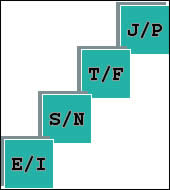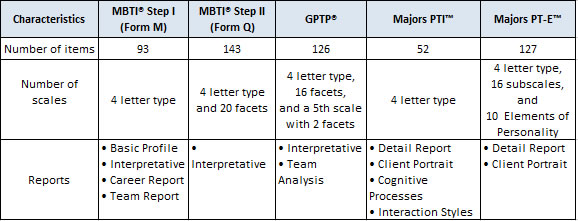| home | calendar of events | our products | contact us |
 |
MAJORS PT-ELEMENTS TM |
|
|---|
|
The Majors Personality Type Elements™ is an assessment tool developed by Dr. Mark S. Majors, based on the Jungian Theory of Psychological Types.
The Majors PT-E™ is a 127 item questionnaire that helps to identifying one's psychological type among the 16 personality types. The Majors PT-E™ does not use a forced choice format for item responses. Instead, it allows the respondent to indicate the level of similarity with two opposite options, what ensures greater precision and clarity for the results. The report provides results on the dichotomies: The report presents the four-letter code and the results for 32 subscales - 4 personality differences within each dichotomy. It also introduces the Elements of Personality Formation™ with rich information to help understanding some behaviors developed in our interaction with others and in response to situations. The Majors PT-E ™ is an instrument that requires specific training and qualification. For the ethical use of the Majors PT-E™, professionals must have thorough knowledge of the theoretical model and the psychometric properties of the instrument, as well as the methods and practices for proper interpretation of the results. People with degree in Psychology and specialization in Psychological Types, or professionals qualified to use the MBTI® or other instruments based on Jungian theory, must attend a brief training program (8 hours) to learn how to interpret the peculiarities of the Majors PT-E™. Other professionals should participate in an intensive program (40 hours) of training and practice to be able to use ethically this instrument. |
|||
| Comparison with others instruments | top of page |
|---|
Comparison between the main psychological type assessment instruments The Association for Psychological Type International (APTI) is an organization dedicated to promoting the appropriate use of the psychological type theory. Personality types provide a useful and practical perspective on our differences in gathering information and making decisions. The creation of the APTi was initially driven by the interest in the use of the MBTI®, but several other instruments are currently available to determine and understand an individual's personality type. The purpose of this paper is to explore how those tools may be useful for APTI members. Considering the general knowledge of the MBTI®, it is not necessary to widely discuss its features; however, a summary of its characteristics is presented for comparison between the main instruments for the psychological type assessment. The tools are listed in historical order: Golden Personality Type Profiler® (GPTP®) is a 126 item instrument. Dr. John Golden is a psychologist from a long line of family members who have been involved with psychological type. His mother, Sally Golden, was the first treasurer of the APTi, and his father sponsored work in the 1980s for the development of the form K, the Extended Analysis Report of the MBTI® tool. Dr. Golden focused his analysis on type development factors, in addition to the type preferences. He relied on a psychological research which relates a 5th dichotomy (Tense-Calm) tied to type development. Majors Personality Type Indicator™ (Majors PTI™) is a 52 item instrument. Dr. Mark S. Majors is a psychologist with extensive psychometric experience that includes data analysis of the Strong Interest Inventory (1994 revision), the MBTI® Form M, as well as the development of IRT (Item Response Theory) scoring. He was coauthor for the MBTI® Form Q. Mark also developed the Majors Occupational Environment Measure™ (Majors OEM™) and was co-developer of X-Styles Interstrength® and the Breckenridge Type Indicator, the first scientifically sound measure of the Enneagram personality model.
Majors Personality Type Elements™ (Majors PT-E™) is an advanced instrument with 127 items. In this instrument, besides the innovative features of the Majors PTI™ (DIW and TPM), there are 3 additional categories of information:
The manual presents the underlying psychometric principles and methods used in item selection, a scale analysis, and the accuracy of the report. Unlike most manuals, Dr. Majors presents ethical issues in using assessment instruments and his in particular. The instruments are compared in several dimensions as shown in the following tables.
The variation in the number of items between the different tools reflects the purpose of the evaluation, the item construction, and the report complexity (e.g., includes facets or not). For example, the GPTP ® adds a 5th dimension, Tense-Calm, which provides insights into the situational stressors and development factors. A review of the item content reveals that the MBTI® repeats 30% of terms or phrases, while other tools do not. (For example, the pair Compassionate-Rational is replicated 3 times on Form M, and such parallel does not occur in GPTP® or in the Majors PTI™. While this may increase reliability, it reduces the overall information that could be available.
Given the published data, the MBTI®, GPTP® and Majors PTI™ instruments report essentially the same internal and test-retest reliability, and similar validity strategies. The MBTI® was built on the assumption of a dichotomous variable (one direction or the other), while other tools use a rating system (from descriptive to very descriptive). The MBTI® inventory suggests that the theory is dichotomous, thus the items should be. On this logic, the Item Response Analysis used for the 1998 revision is built on a basic sorting method. The other test developers have taken the view that, while the theory is dichotomous (Extraversion at one end, Introversion at the other), the best measurement takes into account the range of behaviors rather than forcing an either-or choice. The MBTI® has 50 years of various research studies on which it bases claims for validity. The vast majority of these studies are correlational, which verifies the robust nature of the preferences. All three instruments report factor analytic studies, which confirm the underlying structure of the assessments. The GPTP® and Majors PTI™ tools focus on evidence of type dynamics, and though early in their histories, there is every reason to believe that evidence will build over time that these are measuring the same theoretical framework. Professionals have the opportunity to select the psychological type assessment tool that is most appropriate for each audience. For example, the GPTP® and Majors PT-E™ are excellent tools for use in training, especially the information related to optimism and confidence, for type development exploration. The Majors PTI™ and Majors PT-E™ are outstanding options for those who think that the numerical scores may confuse the client. Others may be familiar to the MBTI® and prefer its scoring format. In addition to these instruments, there are several other questionnaires on personality type that can be accessed on the web. And those with deep knowledge on the theory of personality types don't really need an inventory to aid another person in understanding his or her type. Adapted and expanded version of Dr. Roger R. Pearman analysis for APTI. Link to the original paper http://www.qualifying.org/talent-management/options-jungian-type.php
|
|||
| Case Study | top of page |
|---|
| return to home | top of page |
 |
DR. MARK S MAJORS |  |
TIPS FOR PERSONAL DEVELOPMENT |  |
QUALIFIED PROFESSIONAL AREA |  |
MAJORS PT-E TM |
| Privacy Police | Terms of Use | ©2014 kenkosô All rights reserved | ||

